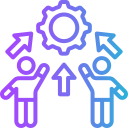
Developing Emotional Intelligence in Remote Teams
Developing emotional intelligence in remote teams is an essential aspect of modern workplace success. As organizations increasingly shift towards distributed work environments, fostering emotional awareness and effective communication among team members becomes more challenging but also more critical. Emotional intelligence enables individuals to understand and manage their own emotions, as well as empathize with others—skills that are pivotal in remote settings where face-to-face interactions are limited. This page explores the fundamentals of emotional intelligence in virtual teams, the challenges unique to remote work, practical strategies for cultivating these abilities, and the business outcomes they drive.
Understanding Emotional Intelligence in the Virtual Environment
Recognizing Emotions without Physical Presence
In a remote environment, the cues that help us interpret emotions—such as body language, tone, and facial expressions—are less accessible or, at best, filtered through a screen. This makes it more challenging to accurately recognize the emotional states of colleagues, potentially leading to misunderstandings or conflict. Developing the capacity to pick up on subtler signals, such as changes in writing style or digital behavior, becomes increasingly important. Leaders and team members alike need to be attuned to these indicators and foster an environment where emotions can be shared openly, ensuring that empathy and understanding remain core to the team culture.
Self-Awareness and Self-Regulation for Distributed Work
Self-awareness is a crucial component of emotional intelligence, especially for remote professionals who often work in solitude. Identifying your own moods and reactions allows you to better manage your responses during interactions, mitigating stress and preventing negative emotions from affecting your work or communication. Self-regulation in a remote context involves consciously setting boundaries, taking necessary breaks, and communicating transparently about your state of mind. By honing these abilities, individuals can contribute to a more emotionally intelligent and resilient team, even when working apart from one another.
Empathy in Digital Communication
Empathy—the ability to understand and share the feelings of another—is particularly significant when interactions are primarily digital. Written messages can be misinterpreted and intentions misunderstood without the richness of face-to-face connection. Practicing empathy remotely means actively considering the context and possible emotions behind colleagues’ actions or words, being mindful of tone, and seeking clarification when unsure. Encouraging a culture of empathy reduces the risk of miscommunication, helps resolve disputes more effectively, and strengthens interpersonal bonds throughout the team.
Identifying Challenges Unique to Remote Teams
Remote employees frequently report feelings of loneliness and disconnect from their colleagues and company culture. Without spontaneous conversations or in-person gatherings, opportunities for personal connection are greatly reduced. To counter this, teams must intentionally create moments for social interaction and foster a sense of belonging. Regular virtual gatherings, mentorship programs, and open channels for informal conversation can help, but the key lies in consistently prioritizing connection as part of everyday work. Leaders play a critical role in modeling this behavior and maintaining a strong, inclusive culture.
Strategies for Fostering Emotional Intelligence Remotely
Formal training programs focused on emotional intelligence can empower remote employees to better understand and manage their emotions. These programs often include modules on self-awareness, self-regulation, empathy, and conflict resolution, tailored specifically for distributed environments. Companies can offer interactive workshops, webinars, or e-learning courses to help employees practice new skills in real-life scenarios. Encouraging participation in EQ training not only builds individual capacity but also strengthens the overall team dynamic, enhancing cooperation and collaboration over time.
